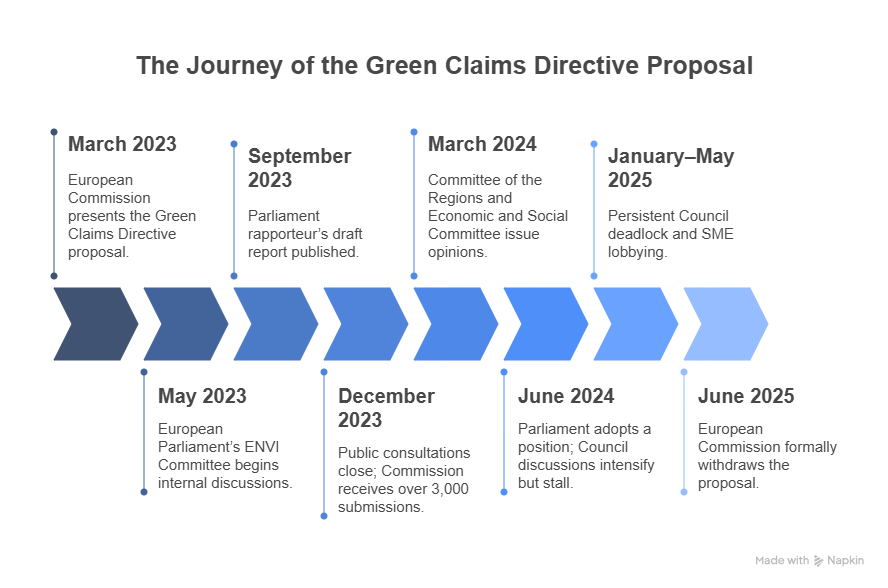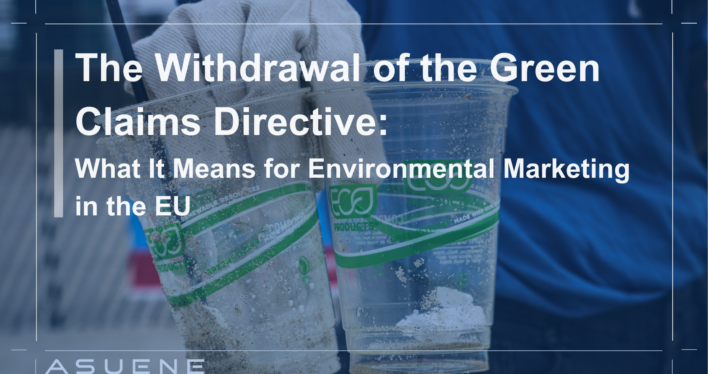- Article Summary
-
Overview
In June 2025, the European Commission officially withdrew the proposed Green Claims Directive (GCD), a legislative initiative that aimed to standardize and enforce the substantiation of environmental marketing claims across the EU. The move has sent ripples through ESG, legal, and marketing communities, especially those preparing for greater regulatory oversight in sustainability communications. Despite the withdrawal, significant compliance obligations remain under existing EU consumer protection frameworks, with new rules already in force that target greenwashing and misleading environmental claims.
Why the Green Claims Directive Was Withdrawn
The GCD was introduced in March 2023 as part of the European Green Deal and the Circular Economy Action Plan. It proposed strict, science-based criteria such as Life Cycle Assessments or Product Environmental Footprint methods for validating claims like “carbon neutral” or “biodegradable.” But by mid-2025, the legislative momentum had stalled.
The directive was originally driven by a troubling evidence base on greenwashing in the EU:
- 53% of green claims were found to give vague, misleading or unfounded information
- 40% of claims had no supporting evidence at all
- Half of all green labels offered weak or non-existent verification mechanisms
- There were 230 sustainability labels and 100 green energy labels in use within the EU, many with vastly different levels of transparency and reliability
Key reasons for the June 2025 withdrawal include:
- A lack of qualified majority in the Council, with Member States like Germany, Sweden, and Czechia voicing strong concerns about regulatory complexity.
- SME resistance, citing compliance costs and procedural burdens, especially around third-party verification requirements.
- Overlap with parallel legislative instruments, leading the Commission to prioritize clarity and simplicity.

No Regulatory Void: Green Claims Still Face Legal Scrutiny
Although the withdrawal of the GCD might appear to leave a gap in environmental claims regulation, this is far from the case. Existing EU law continues to impose legal obligations around marketing and sustainability statements, including:
- The Unfair Commercial Practices Directive (UCPD), which prohibits misleading claims.
- The Consumer Rights Directive, which mandates transparency about product characteristics.
- National-level enforcement and litigation under consumer protection authorities and courts.
Businesses must still ensure that environmental claims are clear and unambiguous, based on evidence, and not exaggerated or selective.

The Empowering Consumers for the Green Transition Directive
With the GCD withdrawn, the regulatory load now rests heavily on the Empowering Consumers for the Green Transition Directive (ECGT) (Directive (EU) 2024/825), which came into force in 2024 and applies fully from 2026 onward across Member States. It amends the UCPD and the Consumer Rights Directive to directly address misleading environmental claims.
Key provisions include:
- Ban on vague or unverified claims such as “eco” or “green” unless backed by rigorous, transparent evidence.
- Restrictions on carbon offset-based claims unless companies disclose whether and how emissions reductions are actually achieved.
- Disclosure requirements for repairability, durability, and software updates for consumer products.
- Blacklist expansion, adding 10 new commercial practices deemed automatically unfair when related to sustainability.
What Comes Next: Future Directions for Green Claims Policy
The June 2025 withdrawal does not mean the EU has abandoned plans for harmonized environmental marketing rules. Instead, it signals a strategic pivot, potentially toward more integrated or simplified approaches in the next legislative cycle (2026–2030).
A possible reintroduction of a revised directive may occur in 2027–2028, likely designed with clearer alignment to existing consumer law and lighter administrative burdens for SMEs. National-level innovation is already underway, with France enforcing climate impact labelling on textiles and electronics, while Nordic countries are advancing public-private verification schemes for eco-labels. A greater role is expected for standard-setting bodies such as ISO and CEN, alongside increased reliance on voluntary frameworks including GRI, CDP, and B Corp assessments to fill gaps in consumer transparency and corporate accountability.
We will also include a forward-looking scenario analysis, mapping potential pathways for green claims enforcement in the EU by 2030, considering regulatory, technological, and market-led developments. scenario analysis, mapping potential pathways for green claims enforcement in the EU by 2030.
Conclusion
Although the Green Claims Directive has been formally withdrawn as of June 2025, the regulatory push against greenwashing is far from over. The Empowering Consumers for the Green Transition Directive now functions as the EU’s de facto green claims rulebook, one with real legal teeth. For companies marketing in the EU, ESG compliance is no longer optional. It’s time to embed claim substantiation, product transparency, and auditability into the core of sustainability strategy.
Why Work with ASUENE Inc.?
Asuene is a key player in carbon accounting, offering a comprehensive platform that measures, reduces, and reports emissions, including Scope 1-3. Asuene serves over 10,000 clients worldwide, providing an all-in-one solution that integrates GHG accounting, ESG supply chain management, a Carbon Credit exchange platform, and third-party verification.
ASUENE supports companies in achieving net-zero goals through advanced technology, consulting services, and an extensive network.


